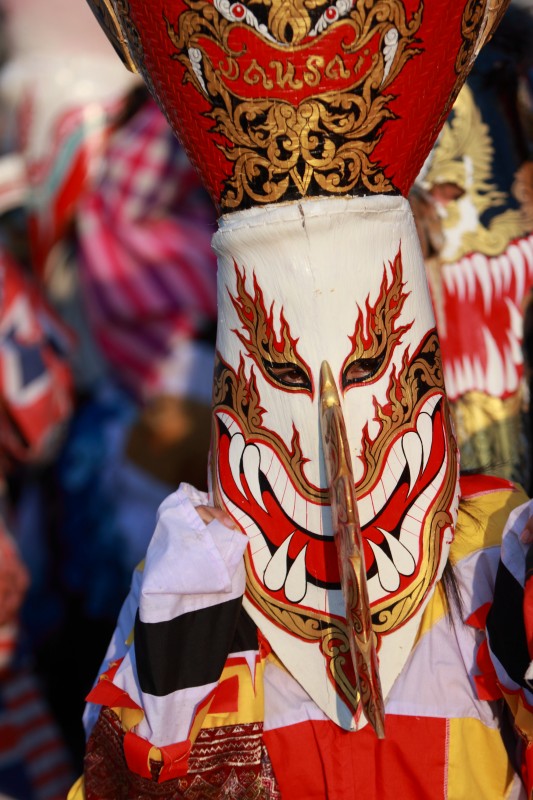Locally known as the Phi Ta Khon festival, the Ghost Festival of Thailand is a kind of masked procession accompanied by dance and music, which is rejoiced annually. It is observed on the first day of the mini Buddhist merit-making vacation called ‘Boon Pra Wate’ in Thai that is of three days. Phi Ta Khon is celebrated either in the months of May, June, or July in the small city called Dan Sai that is situated in Loei, the northeastern province. As the name of the festival suggests, the participants put on the costumes that makes them look like hilarious monsters and ghosts holding big masks. These are hand-made from the colorfully sculpted trunks of the coconut tree, wicker, and bamboo rice steamers to join the ghost parade. The masks are decorated with the beautiful strips of sewn clothes.
Phi Ta Khon is the ultimate time of celebration in northeast Thailand and the most famous event of Loei. Also known as the rain-making ritual, this spooky celebration is normally held on the advent of the rainy season. Distinguishing the festival from Halloween, the poltergeists and phantoms during Phi Ta Khon look for entertainment under daylight.
Legends
Nobody is sure of the exact origin of the festival. But, the Phi Ta Khon is linked with an accepted Buddhist folklore. This well-mixed event of partying and making merit is attributed to the reenactment of the long-communicated legend of King Vessandorn who is the future incarnation of Lord Buddha. As per the Buddhist legend, the people of the town were furious about the give away of two valuable white elephants by the generous King to another ruler who has asked for both. Enraged people forcibly exiled the charitable king. However, the spirits and angels in the jungle well liked the king’s unconditional kindness and so carried a procession to bring him back for ruling over the city. With this, the people of the town accepted the king and were overjoyed. It was from here that the Phi Ta Khon celebration began.

As per one more legend, the king had gone on a long trip such that the subjects failed to remember him and even assumed that he was no more. But, one day when the king came back; the people were overjoyed. They greeted him with such a loud celebration that even the dead woke up who also joined the celebrations. Since then the faithful started to mark the event with celebrations, ceremonies, and the putting up of the masks of the eerie spirits. The main reason behind these celebrations is that it was normally held to remind the heavens of the annual rains by farmers in order to consecrate the crops.
The events
The Ghost Festival of Thailand is celebrated for three days of which the first day features the masked procession of evil spirits. A typical ghost of Phi Ta Khon ghost will have a jumbo head and a long curved nose. However, you will come across a variety of versions of which some have white face or long teeth. As you walk along the path of procession, you might get teased and spooked by these mischievous monsters and by then you will see that you are becoming a part of this pleased spirit.
Coming to the second day, the locals prepare and carry out one more procession to reach the temple, which is accompanied by dances on the streets until the temple. After this, they fire off self-made bamboo rockets. This is done to provoke the gods to initiate rain and a plenty of harvest. With this, the procession comes to an end. In a few parts of the city, competitions are held for the best costumes, mask, and dance. The winners of each age group obtain a prize of in demand brass plaque. Among these contests, the most famous one is the dancing competition.
Now comes the last day when the locals gather at a temple called Wat Ponchai to heed and recite the holy Buddha sermons that are 13 in number. These are recited by the monks there. Marking the culmination of the event, the monsters take off the costumes and masks and then store them for the upcoming year. Now, they go back to the rice fields to earn their living via farming just like their ancestors.
